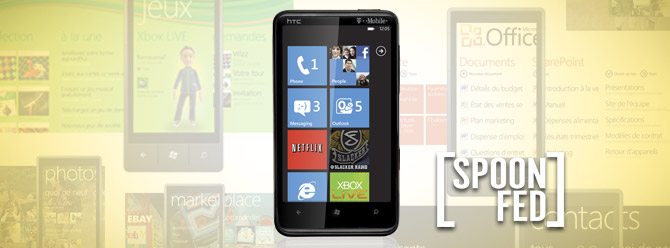Windows Phone 7 Strong Enough to Challenge Android, iPhone
Sign up to receive The Snapshot, a free special dispatch from Laptop Mag, in your inbox.
You are now subscribed
Your newsletter sign-up was successful
I don’t make a lot of predictions, but here’s one: Windows Phone 7 will succeed, and it will force everyone else to rethink the way they design phone software. How do I know? This week we received two Android devices to review, and next to Microsoft’s shiny new OS they look boring. More important, when I talked to five people of varying ages who had seen what Windows Phone 7 could do, all said they would consider buying one--and none of them currently own smart phones. Given that only 17 percent of Americans tote a smart phone now, that’s great news for a company that was pronounced dead in the mobile race not long ago.
The primary reason Windows Phone 7 has a shot at gaining serious traction is that it makes a very strong first impression, based on my hands-on time with the first devices launching next month. While the stock version of Android has the sex appeal of a scientific calculator, and the iPhone’s interface has remained fairly static for the past few years (it’s not easy being iconic), Microsoft’s new entry looks more modern, dynamic, and, well, alive. Microsoft likes to say that the animated Live Tiles on the home screen help you glance at important info and get back to what you were doing. That’s true, but they’re also entertaining. For example, when you pin a favorite contact to the home screen, the tile alternates between the person’s picture and their latest Facebook update.
Little touches such as this abound, which is critical to capturing the attention of shoppers who have found smart phones intimidating. In other words, it’s not enough to make smart phones intuitive in 2010. You need to make them fun, and Windows Phone 7 does just that. Take Xbox Live. The games so far look gorgeous, and I know that people will get a kick out of tricking out their 3D avatars. In the Pictures app, the last photo you took peeks out at you from the left edge of the screen when you’re taking a shot, reminding you that your photo roll is a swipe away. When you’re conducting a Bing search, you’ll automatically see the name of your city in the upper right corner, a visual cue that the engine is ready to perform a local search. Even something as seemingly mundane as Outlook has visual personality in Windows Phone 7. When you send a message it shrinks and flies off the screen.
All of the above ingredients point the way toward a promising launch on AT&T and T-Mobile this fall, with HTC, LG, Samsung, and Dell making the hardware. (Sprint and Verizon Wireless will sell Windows Phone 7 devices early next year.) In fact, I wouldn’t be surprised to see this OS quickly eclipse BlackBerry, at least in terms of mind share. The phones will be more powerful and the software slicker than anything in RIM’s camp.
However, Microsoft still faces serious competition from Android—not because Google’s OS is necessarily superior but because of the avalanche of devices hitting stores at lower prices. This holiday you’ll be able to pick up a solid Android phone for less than $50, and all of the Windows Phone 7 handsets will cost $199 to start. At the same time, Google isn’t exactly standing still on the interface front, having hired away Palm’s Matias Duarte in the spring to be Android’s user experience director.
The biggest question facing Microsoft is how quickly it can ramp up the number of compelling apps. Although there are plenty of recognizable names backing Windows Phone 7, including EA, Slacker, and Netflix, rumors say the Marketplace will launch with as many as 2,000 apps, a far cry from the 90,000 available on Android and the more than 250,000 apps for iOS. Microsoft will need to convince developers that Windows Phone 7 is fertile ground for their limited resources, which won’t be an easy task at a time when Android continues to gain momentum and the iPhone is reportedly making its way to Verizon Wireless.
Despite these obstacles, Windows Phone 7 is a strong contender in the smart phone war. Microsoft might not be able to woo those who have their minds set on Android or iPhone, but it has the potential to grow its share of the mobile pie by expanding the market beyond those upgrading their Curves and first-generation Droids. In fact, the OS is so polished that it will force Apple and Google to step up their own games, which is good for everyone.
Sign up to receive The Snapshot, a free special dispatch from Laptop Mag, in your inbox.
Editor-in-chief Mark Spoonauer directs LAPTOP's online and print editorial content and has been covering mobile and wireless technology for over a decade. Each week Mark's SpoonFed column provides his insights and analysis of the biggest mobile trends and news. You can also follow him on Twitter.


